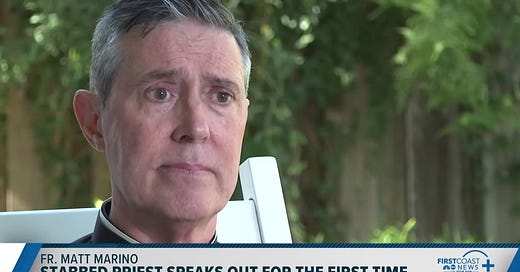A stabbed priest's inspiring story of mercy...
... and beautiful deathbed accounts from a hospice nurse
In recent weeks you might have noticed that I’ve been absorbed by the spectre of the UK’s euthanasia bill as well as reporting on the unnerving US elections, which would have been alarming whichever side won, in my opinion.
So it was a relief to write about a story that started badly, yet has a warm and inspiring ending. Father Mark Marino was stabbed by a stranger in the street in October, but survived due to a series of “wildly improbable events” and spoke words of faith, love and forgiveness in local TV news interviews. I hope the article does justice to the gentle way he expressed how he was inspired by his Christian faith to forgive and accept suffering. If you have time, it is worth watching the interview in the link in the article. It is truly beautiful what devotion to Christ can inspire in a person, even in the most difficult of situations.
One of my favourite Bible verses is John 1:5, “The light shines in the darkness, and the darkness can never extinguish it.” (NLT) Like the witness of Father Marino, many stories of faith demonstrate the truth of this statement - how the love, goodness and light of Christ cannot be destroyed, despite all the best efforts of his enemies. In fact, the darkness can make the light shine ever brighter in vivid contrast. I have just finished writing an article about an even more extraordinary account of faith, hope and love in the bleakest of human suffering under communism - watch this space.
Hope for the end of life
With nine days left until the vote on the euthanasia bill, the need is desperate. There are signs of hope for the campaign against - but it will be a miracle if it is defeated, and it is a miracle we need, so can we agree to storm heaven with prayer for the sake of the most vulnerable in their last days of life?
For a different take on this issue, I recommend the book “Glimpses of heaven: true stories of hope and peace at the end of life’s journey” by hospice nurse Trudy Harris. She writes of the depth and beauty - sometimes obviously supernatural - that can take place at the end of a person’s time on Earth, from her own experience of accompanying them. She has shared insights online, too, for example this description of her calling into end-of-life care:
“A three-year, Franciscan Nursing School degree, taught me to see Jesus in every patient I served and the constant reminder by Sister Naureen Marie, our nursing director that, “Jesus loves you, little one” gave me all the confidence I would ever need in nursing or in life. To be told at the tender age of 20 that “you belong at the bedside of God’s children” is to know the intimate tap on the shoulder, when you sense God’s own heart directing you.”
In another post:
“As a nurse I wanted to comfort people and save lives, not be there when they ended. If you’d asked me then, I’d probably have said what countless people have said to me over the years: ‘How depressing to deal with death every day!’
“But it isn’t depressing. On the contrary, I mark the day I started work with hospice more than 20 years after I graduated nursing school as the beginning of my real education, an education in hope and joy.
“I’ve learned that death is not to be feared. In God’s loving hands it’s the door to peace and everlasting life…
“I knew hospice was my calling because almost from the day I started, I met people who showed me just how thoroughly I had misunderstood death. I came to understand the joy God has prepared for his children.”
The answer to the emotional and physical suffering that can occur at the end of life is to respond with love, which can transform the experience into something otherwordly. To decide to put someone down like an animal is no way to treat human life that has infinite value. It is a surrender to the most nihilistic and materialistic forces that so sadly dominate our age. There is a better way.





Dear Heather. Thank you for your inspirational leadership on the euthanasia issue recently. I have been struck so many times by comments in the debate (as reported in the media, newspapers especially) that demonstrate how life can only approach true fulfillment in the context of its transcendental beginnings and ending. This runs counter to the materialistic/functionalistic and 'only here and now 'account of life that underpins the pro euthanasia position. The transcendental gives meaning and hope to what can be depressing and suffocatingly this worldly. The 'this worldly' can be transformed and released into its full blooded 'this worldliness' only by the embrace of its transcendental origin and destiny. We will redouble our prayerful efforts over the next few days until the vote. May God bless and empower you.